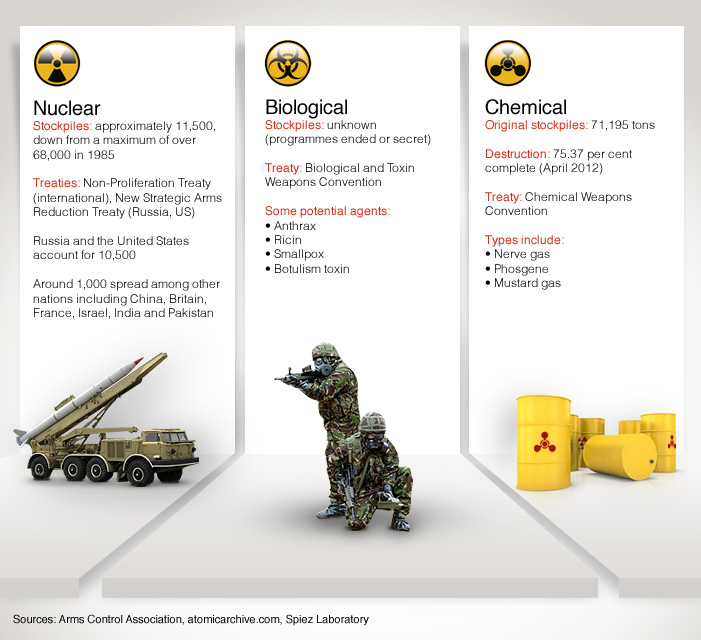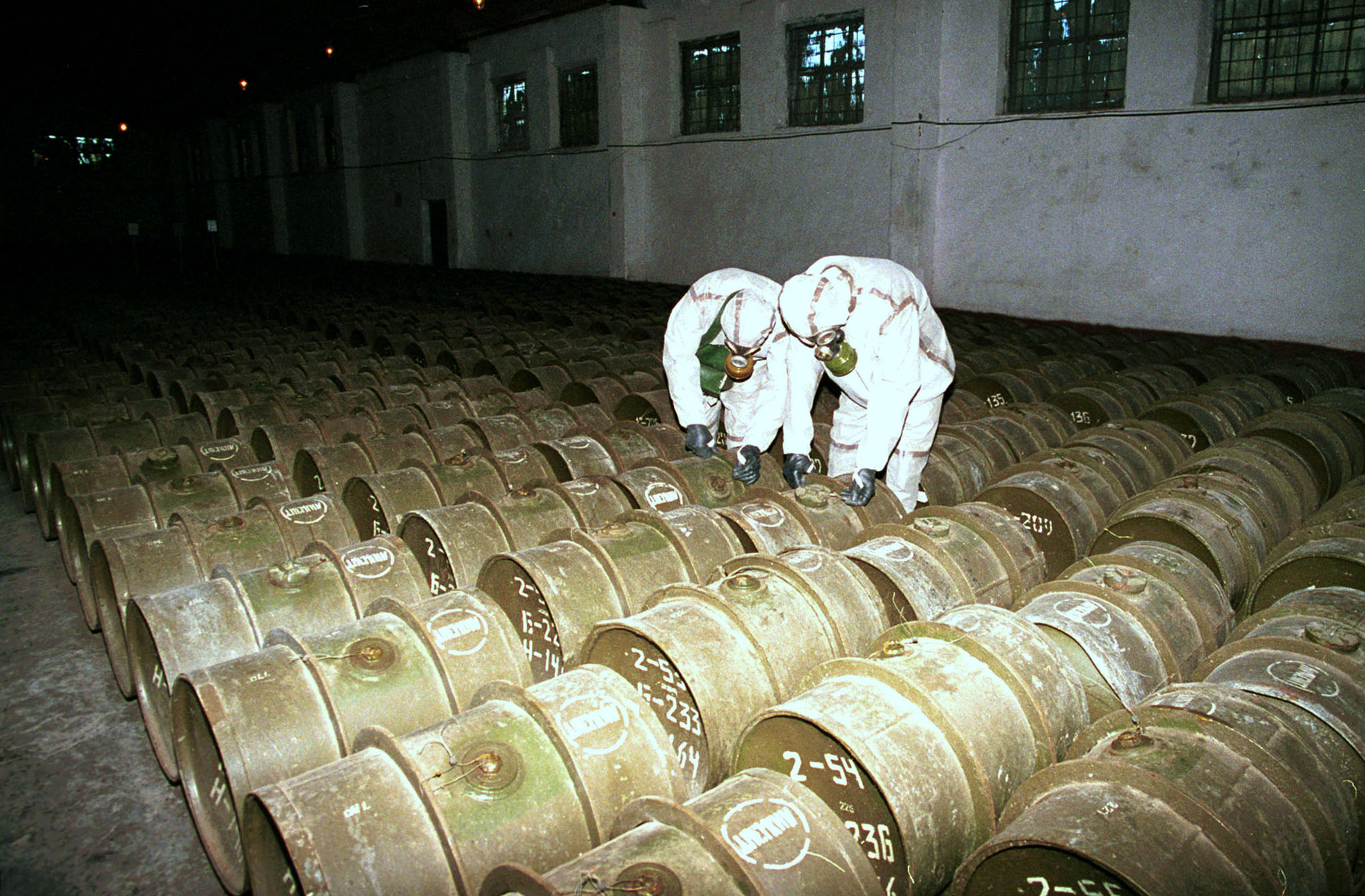Working to counter weapons of mass destruction

The Swiss centre for nuclear, biological and chemical protection is a small laboratory by global standards, but it plays a major role in helping international organisations deal with the dangers of some of the world’s deadliest weapons.
On one side of the motorway, the picture-perfect town of Spiez and Lake Thun. On the other, an industrial zone that backs on to forests and the mountains of the Bernese Alps.
It’s there, squeezed between sporting fields, that the national institute for NBC protection hides. For those looking for a super-secure military site or a James Bond-like secret lair, the Spiez Laboratory, as it’s usually called, is a bit of a letdown.
There’s little to suggest that some of the world’s most dangerous substances are produced or analysed here. On the road outside, hikers walk by without a second glance.
At first view, there isn’t much to write home about inside the main building either. Brutish concrete and dark wood for the most part, it looks and feels like many university and school buildings found across the country, with only the doors providing a splash of colour.
And that, perhaps, is not so surprising. “Our core business is science,” says Stefan Mogl, head of the chemistry section and chairman of the scientific advisory board of the Organization for the Prohibition of Chemical Weapons (OPCW).
Expensive measurement gear and analytical apparatuses have pride of place, and if there weren’t any indications on doors, it would be hard to guess what is going on inside.
Men in suits
Pass one of those doors, though, and much of what the laboratory does is neatly summarized. It’s there, in a special aerosol room, that the cumbersome nuclear, biological and chemical protection suits worn by soldiers and civil defence specialists are tested for resistance, permeability and usability.
It is in fact one of the lab’s few commercial ventures, since it is certified to test the equipment for suppliers before their gear goes on the market. But it also demonstrates how difficult it is to keep humans out of harm’s way when dealing with certain substances or organisms.
For over 80 years, the laboratory has been dealing with chemical weapons, which first appeared during the First World War with horrifying results. With the development of atomic bombs, nuclear protection became an issue during the Cold War, while biology is the most recent addition to the Spiez list of specialties, prompted in particular by fears of terrorism.
The time spent on developing Switzerland’s NBC expertise is recognized internationally. “If the United Nations need someone, Spiez is near the top of their phone list,” explains Mogl.
The laboratory has regularly collaborated with UN bodies such as the OPCW, the International Atomic Energy Agency and the United Nations Environment Programme.
It also advises the Swiss-run International Committee of the Red Cross on how to protect its staff from NBC risks in the zones where it operates.
Small operation
With a small and dedicated staff – around 100 people – the laboratory punches above its weight on the international scene, but much of that is due to the fact that is has accumulated enough knowledge to be a reference and also because Switzerland is seen as neutral and independent.
Since the 1980s, staff have participated regularly in international verification missions, including in Iraq, Albania and Myanmar, while the institute also helps train inspectors for the OPCW.
“Scientific knowledge and missions are closely linked,” he told swissinfo.ch. “Seeing what is out there helps us interpret results in the lab.”
However, staying at the top is not easy for a small establishment. Much of the personnel is made up of highly qualified scientists and technicians working in a unique environment, so any departures are hard to compensate.
To overcome this problem, the laboratory takes in new apprentices every year and also provides facilities for scientists working on a thesis. Training Swiss army and civilian NBC specialists ensures too that manpower is available if an emergency arises in the country, such as when a suspicious powder was found recently at a mail distribution centre near Zurich – fortunately a false alarm.
Some of the working environment is unusual. In another building, teams of two technicians prepare batches of the chemical agents used in weapons, even if Switzerland does not stockpile these arms.
One technician wearing a protection suit inside a small workspace and using a so-called glovebox manipulates the products needed to make the agents, while the other activates the equipment in the workspace from a control zone outside.
The compounds are used later as references for the testing of samples sent from various locations.
Viral
Last year, the laboratory also made headlines for its knowledge of nuclear-related issues. After the Fukushima power plant failure in Japan, technicians and scientists were needed for measurement campaigns and to reassure the Swiss public about the consequences of the accident.
Other work has included investigations into the use of depleted uranium munitions and their consequences for people’s health.
The most recent of the laboratory’s activities has been its work concerning biological weapons. Although officially no one has any, the possibilities offered by modern techniques mean they could become a major threat in years to come. Recent pandemics have also shown the need for home-grown analytical skills.
The latest new building in Spiez is a biology laboratory with the highest-rated security level. This means that scientists and technicians there will be able to work with viruses such as Ebola, Marburg or smallpox, among the planet’s most dangerous varieties.
The lab was set up in a new building, a concrete and steel box within a box designed to keep the viruses within. The specialists inside even have a view of the Eiger.
But they’ll probably be too busy to look outside.
The laboratory is the Swiss centre of expertise for protection against nuclear, biological and chemical (NBC) threats and hazards.
It develops and safeguards the necessary basic scientific and technological knowledge for comprehensive NBC protection.
It also provides national and international organisations, the Swiss authorities and general population with services to prevent, to prepare for and to manage disasters and emergencies.
The laboratory uses its technical expertise as well to support Switzerland’s arms control and peacekeeping efforts.
Source: Spiez Laboratory
Strengthening international arms control is considered a central element of Swiss security policy.
This policy aims to preserve national and international security while minimizing the level of arms held throughout the world.
Switzerland consistently supports non-proliferation and disarmament, particularly where weapons of mass destruction are concerned.
This includes a worldwide elimination of all nuclear, biological and chemical weapons. It has ratified all the international treaties on the subject, and it seeks to make them universally valid and to close any loopholes they may contain. Switzerland also supports international preventive measures (export controls), which are not binding in terms of international law.
Swiss security policy pursues the reinforcement of mutual trust among states. To this end Switzerland supports verifiable arms-control and disarmament mechanisms that do not discriminate against individual states or other entities.
Source: Swiss foreign ministry

In compliance with the JTI standards
More: SWI swissinfo.ch certified by the Journalism Trust Initiative











You can find an overview of ongoing debates with our journalists here . Please join us!
If you want to start a conversation about a topic raised in this article or want to report factual errors, email us at english@swissinfo.ch.